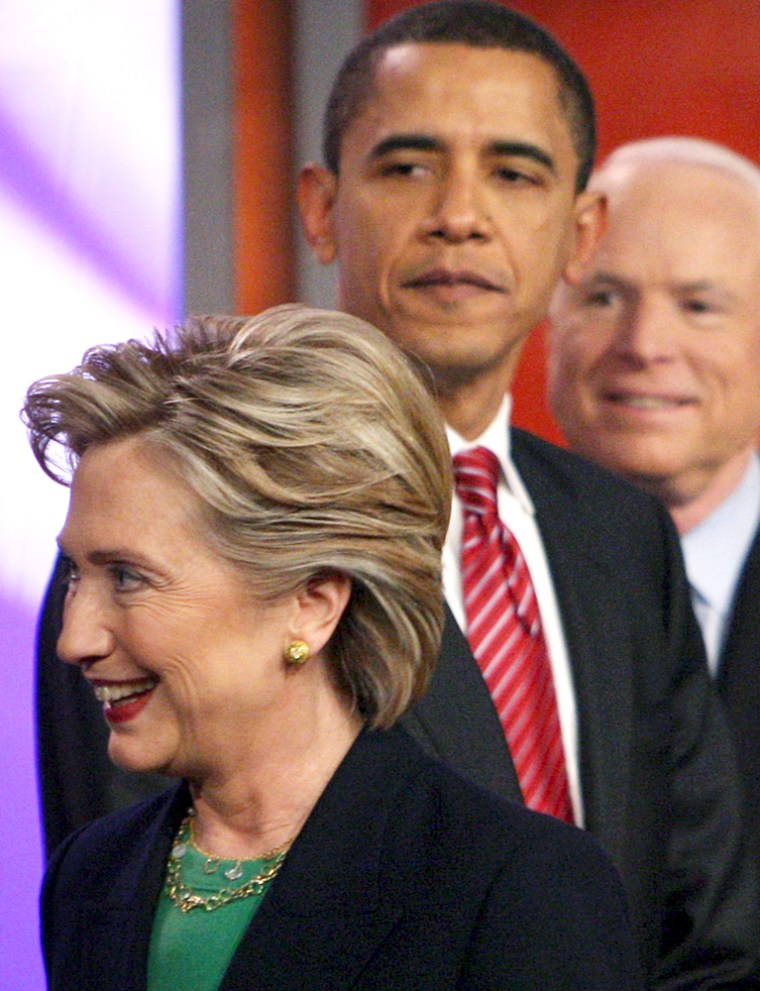There's something familiar about this stage of the presidential campaign. A candidate running on inevitability. A candidate running on experience. A candidate complaining about a rival's media coverage.
Ah yes, that was Sen. Hillary Rodham Clinton's campaign model.
Now, Sens. Barack Obama and John McCain are cribbing from different pages of her play book.
Obama struts his stuff in head of state fashion in war zones, the Middle East and in Europe. Berliners pay homage as if witnessing an address by the fourth U.S. president to visit their city. He daringly decides to deliver his nomination acceptance speech in a sprawling stadium rather than in the closer confines of a basketball arena. He plunks down $5 million to run national ads during the Olympics.
Message: I am a juggernaut.
McCain is running on experience — the candidate who bears the scars of war and cancer and the wisdom of long public service. With McCain, the catch word is judgment; experience might be too close in definition to age. Most recently his campaign has been fretting about Obama's media coverage — the entourage that followed him abroad, the sappy flatteries from television commentators. It posted a Web video, "Obama Love," featuring clips of star-struck pundits and correspondents.
Clinton and her strategists might want to seek some credit.
Before the Feb. 5 Super Tuesday primaries, Clinton was the front-runner who cast herself as the best candidate to confront Republicans. Anticipating her victory, Republican primary contenders ran as much against her as against each other. She was the world-traveling former first lady, the policy wonk and in-the-trenches legislator. And, like McCain now, her campaign chafed at the press that Obama received.
But lest Obama and McCain don't recall, here's a reminder: She lost.
Still, campaign themes repeat themselves. McCain has reason to emulate Clinton tactics. She did, after all, almost win. And certain strategies are hardy perennials not unique to a single campaign.
"In a sense, he's running Hillary 2.0," said John Feehery, a Republican strategist and one-time aide to former House Speaker Dennis Hastert. "But he can make the case this will be a more successful version because it's a general election and he doesn't have any of Hillary's baggage, especially with independent voters."
Certainly there is irony in McCain's complaint about fawning Obama media coverage. McCain himself has been a hot media commodity. But when the Clinton camp objected — and "Saturday Night Live" parodied the media as obsequious Obama fans — reporting on Obama toughened. No doubt, McCain is looking for a similar adjustment.
McCain also has added context to his claim of experience. He's not simply a resume. He's the longtime public servant who fought in Vietnam, was held captive as a prisoner of war and has served in Congress as a member of the House and the Senate since 1983. The public already perceives McCain as better suited to lead on national security issues. The McCain camp wants to expand that perception — McCain is the safe choice; Obama is a risk.
He has gone so far as to say that "Obama would rather lose a war than lose a campaign." This week, he added a caveat to that charge: "I don't think it's a lack of patriotism, I think it's a lack of understanding," he told donors at an Ohio fundraiser. "So he treats the war as just another political issue."
To that extent, McCain is turning the contest into a referendum about Obama, not so much one about President Bush and Republicans.
Obama's counter is full speed ahead. Play offense, not defense. Fill streets and stadiums with people and fill the campaign treasury with cash. For those voters who may have doubts about seeing him as president, he is playing the part to the hilt.
The goal, said Rutgers political scientist Ross Baker, is to build momentum. "The public picks up on it and a sense of resignation almost sets in that there is not much point in getting excited about the opposition," he said.
But it's hardly foolproof.
"He's so programmed, so absolutely meticulously advanced ... that after a while people begin to ask themselves whether it is too much of a good thing," Baker said. "People want to connect in some way with the candidate. If this is really an exercise in human perfection, it can be a problem."
Obama himself seems to have no problem with the image. To be sure, he's not one given to false humility. In a 2006 interview with The Associated Press, before he announced his presidential candidacy, he said: "In a country of 300 million people, there is a certain degree of audacity required for anybody to say, 'I'm the best person to lead this country.'"
